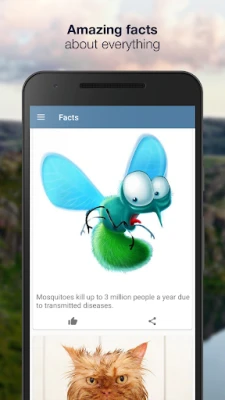
Latest Version
Version
1.3.26
1.3.26
Update
January 05, 2025
January 05, 2025
Developer
Inspirion Apps
Inspirion Apps
Categories
Books & Reference
Books & Reference
Platforms
Android
Android
Downloads
0
0
License
Free
Free
Package Name
com.inspirion.facts
com.inspirion.facts
Report
Report a Problem
Report a Problem
More About FACTS: Amazing & Interesting! modded APK
Do you want to read something interesting ❓
We were looking for useful and necessary applications 🧐
Facts about everything without the Internet 🌐
Boost your horizons❗
The application is aimed at expanding your horizons and pumping the brain. It contains a huge amount of interesting facts on various topics, from cats and animals to the latest scientific discoveries.
And also a lot of useful information about the foods we eat, nutrients, micro and macro elements, and how food can affect our lives.
Get ready to be amazed and entertained with our app, 'Interesting Facts'. This app features a daily dose of fascinating trivia and information from a variety of categories including science, history, entertainment, and more. Whether you're looking to impress your friends with your knowledge or just want to learn something new, 'Interesting Facts' has something for everyone.
Here are some interesting facts about biological sciences:
• The human body has about 100 trillion cells, which are the basic unit of life.
• Our body has over 600 muscles, which help us to move and maintain posture.
• There are about 60,000 miles of blood vessels, which transport blood and oxygen throughout the body.
• The human body has four chambers in the heart, which work together to pump blood throughout the body.
• There are two kidneys, which help to filter waste and excess fluids from the blood.
• There are four lobes in the brain, which are responsible for different functions such as movement, sensation, memory, and emotion.
• Our eyes, which are made up of over 2 million working parts and help us to see.
• There are over 600 types of enzymes, which help to facilitate chemical reactions in the body.
• Our body has three types of muscle tissue: skeletal, smooth, and cardiac.
• Two lungs help to oxygenate the blood and remove carbon dioxide from the body.
• The human body has about 100 billion nerve cells, which help to transmit information throughout the body.
• Our body has a digestive system, which consists of the mouth, esophagus, stomach, small intestine, and large intestine, and helps to break down food and absorb nutrients.
• A respiratory system consists of the nose, trachea, bronchi, and alveoli, and helps to oxygenate the blood.
• A circulatory system consists of the heart, blood vessels, and blood, and helps to transport oxygen, nutrients, and hormones.
• An endocrine system consists of glands that produce hormones and help to regulate various functions.
• A nervous system consists of the brain, spinal cord, and nerves, and helps to coordinate and control the body's responses to internal and external stimuli.
• An immune system helps to protect the body from disease and infection.
• The study of genetics is concerned with the inheritance of traits and the variation of genes within and between populations.
• The study of evolution is concerned with the development and change of species over time.
• The study of microbiology is concerned with the study of microorganisms, such as bacteria, viruses, fungi, and parasites.
• The study of cell biology is concerned with the structure and function of cells, the basic unit of life.
• The study of molecular biology is concerned with the structure and function of molecules, such as DNA and proteins, and their role in the processes of life.
• The study of biochemistry is concerned with the chemical processes that occur in living organisms.
The app has many useful features such as:
• Like and add to favorites ⭐
• Search for all possible facts 🔎
• Remember the last read fact 💾
• Share with friends ✉️
• Works without internet 🌐
• Night mode 🌙
Happy reading of the interesting and amazing science facts 😉
Facts about everything without the Internet 🌐
Boost your horizons❗
The application is aimed at expanding your horizons and pumping the brain. It contains a huge amount of interesting facts on various topics, from cats and animals to the latest scientific discoveries.
And also a lot of useful information about the foods we eat, nutrients, micro and macro elements, and how food can affect our lives.
Get ready to be amazed and entertained with our app, 'Interesting Facts'. This app features a daily dose of fascinating trivia and information from a variety of categories including science, history, entertainment, and more. Whether you're looking to impress your friends with your knowledge or just want to learn something new, 'Interesting Facts' has something for everyone.
Here are some interesting facts about biological sciences:
• The human body has about 100 trillion cells, which are the basic unit of life.
• Our body has over 600 muscles, which help us to move and maintain posture.
• There are about 60,000 miles of blood vessels, which transport blood and oxygen throughout the body.
• The human body has four chambers in the heart, which work together to pump blood throughout the body.
• There are two kidneys, which help to filter waste and excess fluids from the blood.
• There are four lobes in the brain, which are responsible for different functions such as movement, sensation, memory, and emotion.
• Our eyes, which are made up of over 2 million working parts and help us to see.
• There are over 600 types of enzymes, which help to facilitate chemical reactions in the body.
• Our body has three types of muscle tissue: skeletal, smooth, and cardiac.
• Two lungs help to oxygenate the blood and remove carbon dioxide from the body.
• The human body has about 100 billion nerve cells, which help to transmit information throughout the body.
• Our body has a digestive system, which consists of the mouth, esophagus, stomach, small intestine, and large intestine, and helps to break down food and absorb nutrients.
• A respiratory system consists of the nose, trachea, bronchi, and alveoli, and helps to oxygenate the blood.
• A circulatory system consists of the heart, blood vessels, and blood, and helps to transport oxygen, nutrients, and hormones.
• An endocrine system consists of glands that produce hormones and help to regulate various functions.
• A nervous system consists of the brain, spinal cord, and nerves, and helps to coordinate and control the body's responses to internal and external stimuli.
• An immune system helps to protect the body from disease and infection.
• The study of genetics is concerned with the inheritance of traits and the variation of genes within and between populations.
• The study of evolution is concerned with the development and change of species over time.
• The study of microbiology is concerned with the study of microorganisms, such as bacteria, viruses, fungi, and parasites.
• The study of cell biology is concerned with the structure and function of cells, the basic unit of life.
• The study of molecular biology is concerned with the structure and function of molecules, such as DNA and proteins, and their role in the processes of life.
• The study of biochemistry is concerned with the chemical processes that occur in living organisms.
The app has many useful features such as:
• Like and add to favorites ⭐
• Search for all possible facts 🔎
• Remember the last read fact 💾
• Share with friends ✉️
• Works without internet 🌐
• Night mode 🌙
Happy reading of the interesting and amazing science facts 😉
Rate the App
Add Comment & Review
User Reviews
Based on 0 reviews
No reviews added yet.
Comments will not be approved to be posted if they are SPAM, abusive, off-topic, use profanity, contain a personal attack, or promote hate of any kind.
More »










Popular Apps

ChatGPT premium full mod apk The uofficial app by OpenAI

Angry Birds POP Bubble Shooter Rovio Entertainment Corporation

Greek Mythology Quiz Trivia Trivia Quizzes

Turrit-Telegram Plus Messenger SEASTAR FUTURE

Plus Messenger rafalense

Car Eats Car Multiplayer Race SMOKOKO LTD

NASCAR Heat Mobile 704Games

Super Tank Battle - myCityArmy UnknownProjectX

Mario Kart Tour Nintendo Co., Ltd.

Elvenar - Fantasy Kingdom InnoGames GmbH



















